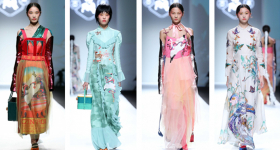After generations of erasure, stereotyping and yellowface, APIA audiences may feel something visceral when we see other Asian Americans on screen. Most of the stories about us that have managed to make it through the Hollywood machine have been exoticizing, troubling and indicative of the historical violence that Asians and Asian Americans have endured at the hands of white supremacy.
Crazy Rich Asians has emerged as the first mainstream Hollywood movie with an entirely Asian cast since The Joy Luck Club and is being hailed as a major symbolic victory for Asian Americans. Arguments in favor of the movie seem to tacitly acknowledge the “Asian Inflation” phenomenon; in other words, when Asian American media gets an inordinate amount of attention and praise, so that the piece of media appears better than it actually is. These arguments in defense of the film invoke the importance of a diversity of stories of varying quality. Author Viet Thanh Nguyen, for one, called Crazy Rich Asians the result of “narrative plenitude.” That is, for every Joy Luck Club, you need a Harold and Kumar. What we see in Crazy Rich Asians, however, is a surface-level attempt at representation, along with an agenda to create a high-grossing uncritical romcom made for nothing but international sales.
Representation for its own sake is not subversive; it’s simply a step above tokenization.
If we’re going to treat this movie as subversive for how ordinary it is, we actually have to ask ourselves if it is subversive, or if it’s the type of media that allows us to be complicit in our own takedown. Representation for its own sake is not subversive; it’s simply a step above tokenization. In this case, the question of media representation gives us an out.
One of the unique strengths of Asian American liberation movements is that we are able to unify politically and work together toward self-determination, despite which countries and conflicts we might have hailed from generations ago. We take this for granted now, but there was a time when solidarity between Asians in America was not assumed, so calling oneself Asian American was uniquely revolutionary. In the past, what got us organizing was seeing ourselves reflected, not in mainstream media and aspirational depictions of privilege, but by identifying with the struggle for liberation and strongly rejecting the oppressions that caused others to suffer. Civil Rights leader Bob Moses observed that Black opposition to the Vietnam War did not come primarily from a deep knowledge of Vietnam, but from the historical imprint of U.S. abuses against Black people. On the other hand, Asian American opposition to the war came not only from what Asian Americans knew from the United States, but also from empathy for and identification with Vietnamese people. A statement on the Vietnam War from the New York Asian Coalition stated, “As Asians, many of us have seen in the faces of our Vietnamese sisters and brothers the faces of our children, our families, our people.” In those years, a global perspective took root in political and creative endeavors as Asian Americans fought for self-determination in parallel with Asians who were railing against U.S. imperialism. This solidarity fostered a far-reaching and powerful Asian American anti-war movement.
The institutionalization of Asian American studies downplayed the radical origins of grassroots organizing. In her book Serve the People: Making Asian America in the Long Sixties, Karen Ishizuka discusses the defanging of APIA political movements as our radical histories were co-opted:
Activist-scholar Glen Omatsu wrote that, in the mid 1990s, he sat in on an Asian American Studies class. Although the lecture on the period between the 1950s and early 1970s was cogent, tightly organized and even well received by students, “there was only one problem: the reinterpretation was wrong on every aspect.” Omatsu went on to explain that, contrary to what the instructor claimed, the leading influence had not been MLK but Malcolm X; the movement had not been centered on racial identity, but embraced fundamental questions of oppression and power; the main thrust had not been to seek legitimacy and representation within American society, but to pursue the larger goal of liberation.
What does representation represent? As the quote implies, I would argue that in the last several decades, Asian Americans have not been seeking representations of our experience, but legitimacy in the form of recognition from the dominant culture. There is a growing list of media from smaller independent creators as well as a library of Asian media, but both often get dismissed for not being distinctly Asian American. However, there were times that Asian-made media influenced major demographics of American culture, such as when kung-fu movies — as opposed to Hollywood blockbusters — were often the main titles for theaters in low-income minority neighborhoods because they were cheaper and easier to acquire. Kung-fu movies in the United States were at their most popular in the 70s, coinciding with the height of the Black Power movement and inspiring spin-offs within the Blaxploitation genre and even martial arts classes in the Black Panther Party. In his book Foundation: B-boys, B-girls and Hip-Hop Culture in New York, Joseph Schloss discusses how martial arts cinema played a major role in shaping Black masculinity and hip-hop, an influence that persists to this day. But if Asian media was embraced by other communities of color, we took no notice. Not even when those communities shared political affinity with ours in their own fight for self-determination. In the trailer for Crazy Rich Asians, Rachel (played by Constance Wu) asks Nick (Henry Golding), “So you’re like an Asian Prince William?” The line, which likens the male lead to British royalty, lays out the fantasy plainly. After all, legitimacy isn’t being embraced by a minority group (Blackness), but by a majority one (whiteness).
Rather than aspire toward self-determination against oppression, the film carries with it all the promises of globalization. It tells us that we, too, can thrive within this same system.
Crazy Rich Asians cannot be the answer, or even one of the answers, to what we are lacking. It has all of the traits of other films that enrage Asian American viewers. Political scientist Ian Chong says the film exemplifies “the worst of Singapore.” It’s rife with colorism, erasure of Malay and Indian people who make up a sizable Singaporean minority (aside from a brief scene where two characters are terrified by Sikh security guards), exotification and a celebration of wealth so enormous that most Asians in the United States or abroad could never expect to have it. Sure, it’s no Memoirs of a Geisha, but more contemporary stories like Crazy Rich Asians or Slumdog Millionaire continue to satisfy western intrigue over the supposed secrets behind Asian American success. These play heavily into the model minority myth, which, ever since its inception, has been an insidious tool to defend acts of racism and discrimination against Asians and other minorities. What distinguishes legitimacy from representation is that legitimacy is aspirational. Rather than aspire toward self-determination against oppression, the film carries with it all the promises of globalization. It tells us that we, too, can thrive within this same system. We, too, can become a fiercer, more authentic, more glamorous version of ourselves, so long as we ignore the supply chain where that glamour is sourced. This movie got Asian Americans mainstream recognition — as if the only way for an Asian man to feel attractive and masculine is if the dominant culture is forced to recognize him as such. As if the only way for Asian women to justify feelings of love is to see herself swapped in with a Drew Barrymore-esque role in an all-too-familiar Cinderella story.
What makes Asian American liberation movements so radical is that they are based in solidarity rather than self-promotion. If it was respectability we were seeking, we got it — but we didn’t get anything remotely subversive or revolutionary in the trade. Respectability isn’t worth fighting for; the harder we work for it, the more we strengthen the grip of white supremacy. Hopefully we will again be driven to watch and tell the stories that identify with Asians working to become free, rather than conflating them with stories of Asians who benefit from their erasure. Otherwise, we can never hope to have a strong political analysis or a strong liberation movement in Asian America. We may as well be sharpening the knife used against us.










Comments